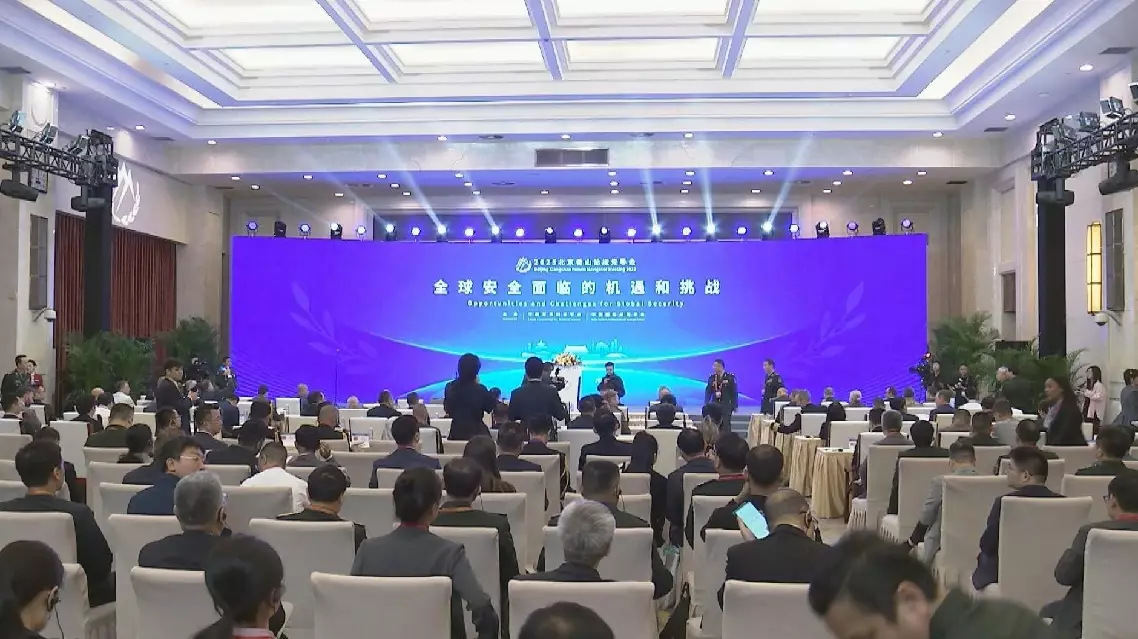The Beijing Xiangshan Forum Navigator Meeting kicked off in Beijing on Tuesday morning, bringing together over 200 defense officials, experts, scholars and media representatives from more than 30 countries and international organizations to discuss global security issues in preparation for the main forum later this year.
This Navigator Meeting, a crucial step in the forum's development, serves as a precursor to the main Beijing Xiangshan Forum, which is scheduled for the fall.
Since its inception in 2006, the Beijing Xiangshan Forum has successfully hosted eleven editions and has become a prominent international defense and security forum. To further optimize the planning and design of the forum's serial activities and create more opportunities for exchange and cooperation, this year, for the first time ever, a navigator conference was held before the opening of the main forum, combining defense exchange and academic dialogue.
"Firstly, this conference is intended to make preparations for the main forum by collecting opinions and suggestions from participants to focus on their positions and security concerns. Secondly, the event is intended to provide more dialogue and exchange opportunities on international security. And thirdly, it is designed to strengthen practical cooperation among defense departments of various countries by exploring potential cooperation and implementing existing plans, to provide important input for pushing the forum to achieve more practical cooperation results," said Wu Jianguo, director of the Office of the Secretariat of the Beijing Xiangshan Forum.
In the coming two days, the event will convene four roundtable discussions on the Trend of Defense and Military Cooperation in the Asia-Pacific, the Trend of Great Power Relations after the Super Election Year, the Role of BRICS in Global Security Governance, as well as the Role of the U.N. in Resolving Global and Regional Hotspot Security Issues. These in-depth discussions aim to contribute insights to building a more just and reasonable international order.

Beijing Xiangshan Forum Navigator Meeting opens to chart course for global security
From cutting-edge technology exhibitions to retail stores thousands of kilometers away from Europe and Southeast Asia, China-made robot vacuum cleaners are increasingly becoming a popular choice among consumers worldwide.
At electronics retailers in Berlin, Germany, Chinese brands such as Roborock and Dreame occupy prominent positions in dedicated robot vacuum sections, offering a wide range of products priced between 200 and 2,000 euros.
Many local consumers said that when purchasing smart home appliances including robot vacuum cleaners, they tend to give priority to Chinese-made products.
"It's a good price and good quality. It's also the innovation. I have a feeling that the European brands are not innovating enough," said one customer.
"I think they're always on top of the other technologies. They are getting them out faster. A lot of us are switching to the Chinese technology," another consumer said.
Germany is one of the most important overseas markets for China's floor-cleaning robots.
According to data from market research firm GfK, from January to November 2025, more than six out of 10 robot vacuum cleaners sold in Western Europe were Chinese brands.
Industry data also point to a strong global momentum.
According to the International Data Corporation (IDC), global shipments of smart robot vacuum cleaners reached 17.424 million units in the first three quarters of 2025, representing a year-on-year increase of 18.7 percent.
Chinese brands including Roborock, Ecovacs, Dreame, Xiaomi and Narwal ranked among the world's top five in terms of shipment volume, with a combined share of nearly 70 percent of the global market.
At a robot vacuum cleaner manufacturing plant in Huizhou, south China's Guangdong Province, workers were seen stepping up production of newly launched models that recently debuted at the Consumer Electronics Show in the United States, which concluded Friday in Las Vegas, Nevada.
The factory adjusted its production lines as early as December 2025 and stocked inventory in advance for overseas markets to ensure that new products could be delivered to global consumers at the earliest possible time.
"In 2025, Roborock's global shipments exceeded 7.2 million units. Since 2024, overseas revenue has accounted for more than 50 percent of our total revenue. Our products have now been sold to more than 170 countries and regions, serving more than 20 million households worldwide," said Quan Gang, president of Roborock.
At another robot vacuum cleaner manufacturing facility in Dongguan, Guangdong, rising overseas orders have prompted the company to upgrade its production lines with intelligent technologies to further boost capacity. The factory is currently operating at full load to meet a growing demand.
"For 2026, we have already obtained overseas orders worth at least 300 million to 400 million yuan (around 43 million to 57.3 million U.S. dollars). In addition, we've engaged in strategic cooperation with European home appliance group Cebos Group, and our total confirmed orders have exceeded 600 million yuan (around 86 million U.S. dollars)," said Zhang Junbin, founder and CEO of Narwal Robotics.

Chinese robot vacuum brands gain strong global traction










